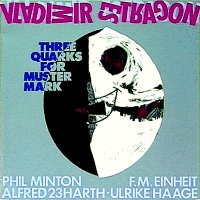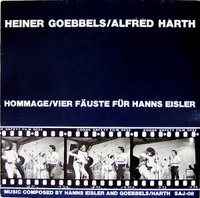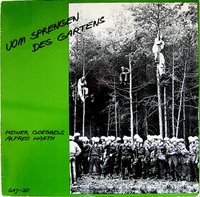ALFRED HARTH - NUN (O BACK CD,Selfrelease)

New music collectors must be having a hard time keeping track of the constantly changing vision of Alfred 23 Harth, whose career is now approaching its fifth decade and still showing no sign of "stagnation". Harth has played with virtually everybody, although he's best known for his work with Cassiber and his contribution to Lindsay Cooper's Oh Moscow, and his own music is a fertile ground where jazz, improvisation, techno and acousmatics rub shoulders, often with stunning results, enriched by the mind-boggling reed technique that's made him one of the most inventive and recognizable saxophone / clarinet players on the planet. For several years now this German utopian has been living in South Korea, where, besides collaborating with the best local talents and joining Otomo Yoshihide's New Jazz Orchestra, he's produced a sizeable body of work in very limited, often "print-on-demand" CDR editions: go to alfredharth.de for direct inquiries. His "Mother Of Pearl" albums are characterized by gorgeous artwork and (it goes without saying) magnificent music, and these two titles are a perfect testament, concluding the series.
Nun, explains the author, is a one-word poem with multiple meanings (including "eye" and "snow" in Korean). Harth applies a precise choice of subjects, times and past collaborators in what, like Seoul Milk, is a multilayered, undefinable work whose aesthetic is unquestionably and thoroughly "23". "Dog", based on a short poem by Yun Dong-Ju, is high-level electroacoustic chemistry, a soundworld mixing fragments of compositions dating from 1967 and 1984 as well as current sources and Harth's own lines. "For Taran" is a monstrous bass clarinet solo (dedicated to Taran Singh "who runs a free jazz program broadcast in France"), a virtuoso reminder of how good Harth is at improvising for long stretches without ever sounding pretentious or boring. "Bref", recorded in 1998 in Frankfurt and featuring Micha Daniels, is another specimen of surreal anarchy on which guitar, mandola and percussion form strange patchworks with a deranged primordial drum machine and a delirious Farfisa organ, reaching its apex in a strident bagpipe solo (a mizmar, I guess from the notes) over a psychedelic background. After "Test for Tokyo", a "percussive and dirty" solo for sax, contact microphones and Kaoss pad, Harth gives us the dulcis in fundo treatment with "Leasing a Straw Hut" and especially "108". Both pieces are surrounded by an ominous aura, their complex development built on masterful juxtapositions of reeds and excerpts from past projects. "Leasing", like "Dog", is based on a poem, this time by Yi Kyu-Bo and features the sound of the sea from Hakdong on the South Korean island of Namhae, while "108", named after the "108 grievous and troubled thoughts counted by the Buddhists in order to become aware of and finally get over them", is a stirring potion reverberating with (involuntary?) echoes of Roland Kayn. This menacing dark current brings Nun to an end, and though it's a disheartening way to go out, you do so safe in the knowledge that you've experienced artistry of the highest order.
In Paris Transatlantic
ALFRED HARTH - Seoul Milk (Slowalk)

Seoul Milk dates from between 2002 and 2005 and is subtitled "a sonic bouquet of Seoul broadcast all the way to Europe". Its three movements present a paradoxically well-conceived, ordered chaos of shortwave radios and TV sets emitting kaleidoscopic signals that mesh with fragmented drum machine patterns and flanged vocals from the streets, as Harth's assemblage follows the convulsive evolutions of his individual sources, which include folk songs, children's voices, creaking metal, subsonic pulse, snippets of languid pop songs and a vision of downtown hell. Imagine a Korean version of a souk; the local male voices captured by Harth sound like disguised muezzins. The third and final section fuses all the different perspectives into a disjointed, oscillating quasi-disco pattern leading up to the ironic ending, culled from the opening ceremony of the 2002 World Cup, all pompous music and official announcements, wiping out the remnants of our cerebral comfort. If you enjoyed Jess Rowland's Scenes From The Silent Revolution on Pax Recordings you'll love this too.
In Paris Transatlantic
.

New music collectors must be having a hard time keeping track of the constantly changing vision of Alfred 23 Harth, whose career is now approaching its fifth decade and still showing no sign of "stagnation". Harth has played with virtually everybody, although he's best known for his work with Cassiber and his contribution to Lindsay Cooper's Oh Moscow, and his own music is a fertile ground where jazz, improvisation, techno and acousmatics rub shoulders, often with stunning results, enriched by the mind-boggling reed technique that's made him one of the most inventive and recognizable saxophone / clarinet players on the planet. For several years now this German utopian has been living in South Korea, where, besides collaborating with the best local talents and joining Otomo Yoshihide's New Jazz Orchestra, he's produced a sizeable body of work in very limited, often "print-on-demand" CDR editions: go to alfredharth.de for direct inquiries. His "Mother Of Pearl" albums are characterized by gorgeous artwork and (it goes without saying) magnificent music, and these two titles are a perfect testament, concluding the series.
Nun, explains the author, is a one-word poem with multiple meanings (including "eye" and "snow" in Korean). Harth applies a precise choice of subjects, times and past collaborators in what, like Seoul Milk, is a multilayered, undefinable work whose aesthetic is unquestionably and thoroughly "23". "Dog", based on a short poem by Yun Dong-Ju, is high-level electroacoustic chemistry, a soundworld mixing fragments of compositions dating from 1967 and 1984 as well as current sources and Harth's own lines. "For Taran" is a monstrous bass clarinet solo (dedicated to Taran Singh "who runs a free jazz program broadcast in France"), a virtuoso reminder of how good Harth is at improvising for long stretches without ever sounding pretentious or boring. "Bref", recorded in 1998 in Frankfurt and featuring Micha Daniels, is another specimen of surreal anarchy on which guitar, mandola and percussion form strange patchworks with a deranged primordial drum machine and a delirious Farfisa organ, reaching its apex in a strident bagpipe solo (a mizmar, I guess from the notes) over a psychedelic background. After "Test for Tokyo", a "percussive and dirty" solo for sax, contact microphones and Kaoss pad, Harth gives us the dulcis in fundo treatment with "Leasing a Straw Hut" and especially "108". Both pieces are surrounded by an ominous aura, their complex development built on masterful juxtapositions of reeds and excerpts from past projects. "Leasing", like "Dog", is based on a poem, this time by Yi Kyu-Bo and features the sound of the sea from Hakdong on the South Korean island of Namhae, while "108", named after the "108 grievous and troubled thoughts counted by the Buddhists in order to become aware of and finally get over them", is a stirring potion reverberating with (involuntary?) echoes of Roland Kayn. This menacing dark current brings Nun to an end, and though it's a disheartening way to go out, you do so safe in the knowledge that you've experienced artistry of the highest order.
In Paris Transatlantic
ALFRED HARTH - Seoul Milk (Slowalk)

Seoul Milk dates from between 2002 and 2005 and is subtitled "a sonic bouquet of Seoul broadcast all the way to Europe". Its three movements present a paradoxically well-conceived, ordered chaos of shortwave radios and TV sets emitting kaleidoscopic signals that mesh with fragmented drum machine patterns and flanged vocals from the streets, as Harth's assemblage follows the convulsive evolutions of his individual sources, which include folk songs, children's voices, creaking metal, subsonic pulse, snippets of languid pop songs and a vision of downtown hell. Imagine a Korean version of a souk; the local male voices captured by Harth sound like disguised muezzins. The third and final section fuses all the different perspectives into a disjointed, oscillating quasi-disco pattern leading up to the ironic ending, culled from the opening ceremony of the 2002 World Cup, all pompous music and official announcements, wiping out the remnants of our cerebral comfort. If you enjoyed Jess Rowland's Scenes From The Silent Revolution on Pax Recordings you'll love this too.
In Paris Transatlantic
.




